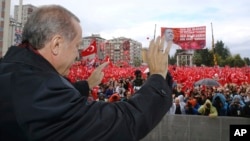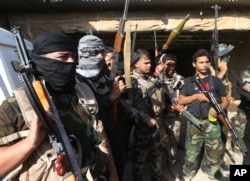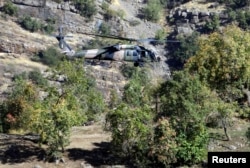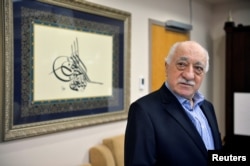Preventing the disintegration of Syria and Iraq is the priority of Turkey, says the Turkish president's chief of international relations.
“I think there is still hope for the Middle East; we can still create unity of these countries,” said Ayse Sozen Usluer in an exclusive interview with VOA.
With Iraq and Syria wracked by the conflict against Islamic State and Syria's civil war, Ankara sees the key to their unity in defusing regional and sectarian rivalries, primarily between Iran and Saudi Arabia. “We have good relations with Saudi Arabia; we have good relations with Iran,” Usluer said, stressing Turkey’s unique position. “Each time we meet and sit with them, we always talk about protecting unity.”
The threat to Iraq’s Turkmen, ethnic Turks, and the wider Sunni minority posed by those rivalries is cited by Ankara as a reason it has massed military forces on the Iraqi border. Baghdad has accused Ankara of seeking to retake Iraqi territory that was once part of the Ottoman Empire, but Usluer insists Turkey's military presence is only a precaution.
“As long we protect the territorial integrity of Iraq, there is not going to be any ambition to enter Iraq ... And Turkey should be in the operations and also at the table, because Turkey has very strong ties with Iraq. This is because of Turkey’s interest, this is about protecting the interests of small groups in the region,” said Usluer.
Iraq's suspicions of Turkey meddling in Baghdad's affairs are being further exacerbated with Turkey increasingly extending its influence in Iraq through a deepening relationship with Masoud Barzani, president of Iraq's semi-autonomous Kurdistan Regional Government. Usluer says Barzani is seen as playing an increasingly important role in Turkey’s battle against Kurdish rebel group the PKK, which is fighting the Turkish state for greater minority rights.
“Barzani has become the first Kurdish leader to understand the problem of the PKK and the Kurdish problem in Turkey and he is able to divide these problems. He accepted the PKK as a terrorist organization. He knows about the Kurdish problem in Turkey,” said Usluer.
The PKK military command is based in neighboring northern Iraq. Despite intense lobbying by Ankara, Barzani had refrained from directly confronting the separatist group, but Usluer suggests a change may be in the offing.
“He [Barzani] knows who is spoiling the peace of his region," she said. "I am sure he can take measures against these provocateurs and groups.”
The PKK has been extending its influence across Iraq and Syria. Much of that success is due to taking up arms against Islamic State. PKK's affiliate, the YPG in Syria, enjoys military support from the United States, European countries and Russia.
To counter that threat, Turkey has reached out to Russia. An early benefit of that policy was Moscow offering tacit support to Ankara's military incursion into Syria against Islamic State and the YPG.
Moscow, Usluer says, won't stand in the way of Ankara’s key goal of creating a haven in Syria. That goal is expected to be part of discussions next month when Turkish Prime Minister Binali Yildirim visits Moscow for talks about Syria and deepening bilateral relations.
Deepening ties with Moscow is leading to some of Turkey’s NATO allies starting to question where Ankara’s loyalties lie.
“This is not a big choice between the West and Russia; it's not an either or choice,” Usluer said, dismissing such concerns. ”Turkey can diversify its foreign policy choices, because we are not living in the Cold War anymore. The world is more independent, all powers, even small powers, are open to cooperate with different counties and establish relations with different countries.”
Ankara’s diversifying of its relations coincides with severe, if not unprecedented, strains with its Western allies.
Ankara remains at loggerheads with Washington over the latter's support of Syrian Kurdish forces and Turkey’s demand for the extradition of U.S.-based Turkish cleric Fethullah Gulen, who has been blamed for July’s failed coup in Turkey. Those ties could be further strained over rising speculation that Gulen could be allowed to leave the United States for a third country.
“This is also one of our primary concerns,” warns Usluer. “He [Gulen] should be detained at the moment, at least in his home, in order not to let him go to another country.”
Another key anchor with the West, Turkey’s decades-long bid to join the European Union, is on the verge of being severed, with its effort facing collapse, amid mutual recriminations. Usluer says membership remains a strategic goal, but adds, “It will not be the end of history, if it ends,” citing Brexit, Britain's decision to leave the European Union, as an example.







